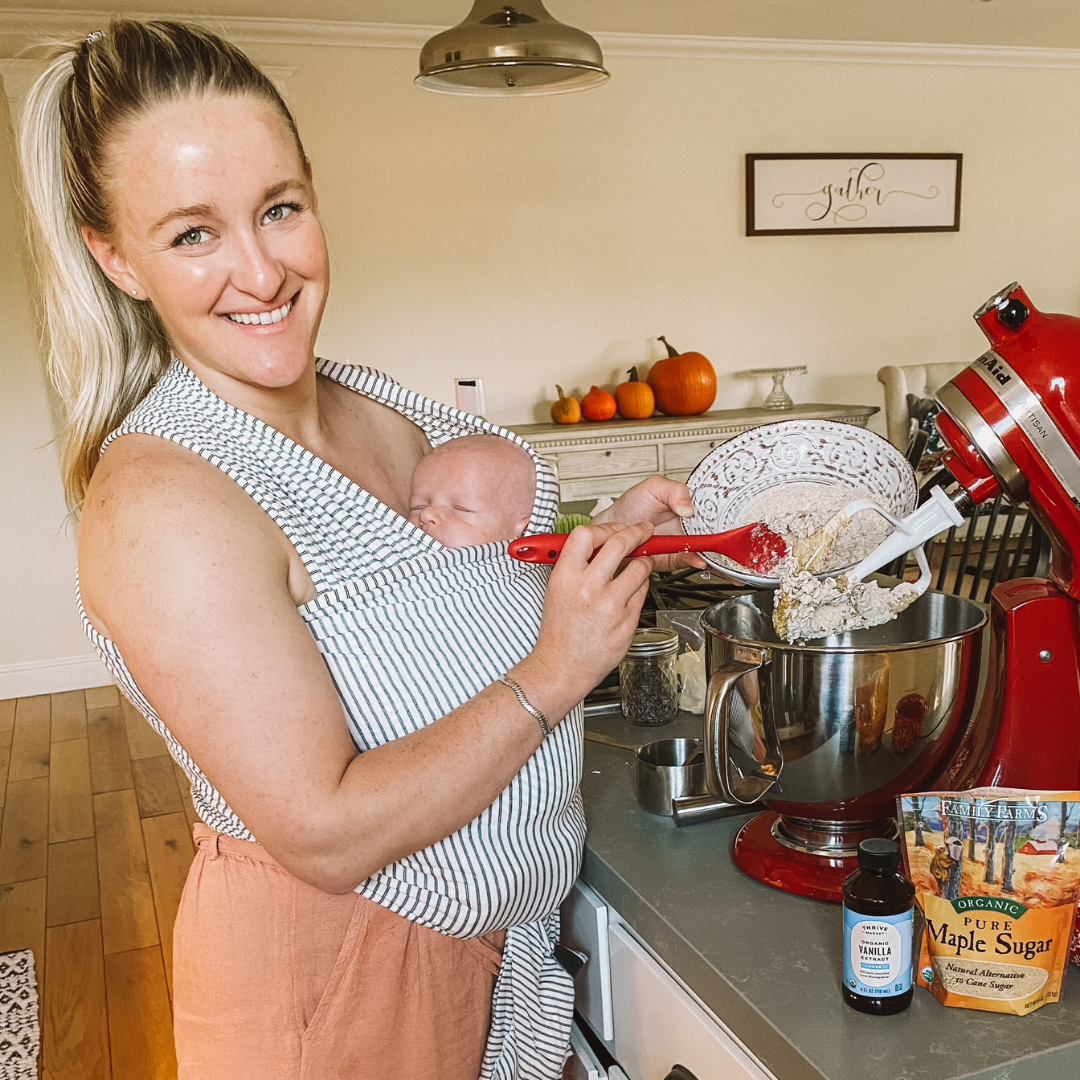Eating for Two: How to Eat In Order to Maintain a Consistent Breast Milk Supply
Mommy Care Team
Helpful Tips and Recipe From Michaela Clauss
As a new mom, breastfeeding turned out to be way more work than I thought it would be! I just thought things would come naturally and go smoothly and the baby would just easily latch on (lol) and suckle away.
Well, that is not how it went! As if proper latch wasn’t hard enough, then it was figuring out if he was actually hungry or just tired? And why did he seem frustrated at times like he wasn’t getting enough milk? Truth was, I was stressed, busy, and not focusing on fueling me first, in order to be able to nourish us both. Once I focused on this, things got much easier.
You probably see all of the ads for lactation boosting products and wonder if they really work and are worth the money. I tried several, but none that made a difference for me until I got back to the basics of focusing on wholesome nutrition and taking care of myself. Many of the snacks or cookies out there are very processed and don’t provide mamas with the nutritional support they need to keep up milk supply, but thankfully you can make your own treats for less money, and focus on good nutrition to help keep up milk supply consistently!

Eating for Milk Supply
Focusing on healthy nutrition is so important for consistent milk supply. As a nursing mama our bodies need enough energy to keep our bodies fueled and to create milk for our babies to keep them healthy and growing! So, how do we do this?
Focus on getting enough protein in your diet. Ideally 60-70 grams of protein per day. That means about 20g per meal. This could like 3 eggs, a serving of a quality protein shake, about 1/2 c (4 oz) of an animal protein or beans. Protein also helps keep your blood sugar stable, which helps with consistent milk production, supporting postpartum hormones, and weight loss.
Enjoy healthy fats! The fats you consume are transferred into your baby’s milk and support your hormone health. So focus on quality and don’t be afraid of eating healthy fats, our bodies need them! Healthy fats include things like avocados and their oil, coconut oil, nuts, olives and their oil, grass fed butter or ghee, wild salmon, and pasture raised eggs and meats! Avoid vegetable oils which are inflammatory and not as supportive to your hormones and your baby’s growing brain!
Fruits and Vegetables are obviously also very important to replenish your bodies nutrient stores after 9-10 months of growing your baby! They provide fiber that supports your gut microbiome, which supports healthy hormones. And healthy hormones make for a healthier happier mama with enough milk for baby!
Let’s talk about carbs... they can often be the easiest to reach for when your crazy busy between nursing sessions, but they unfortunately aren’t as supportive as protein, fats, and fruits and veggies. When you do enjoy carbs try to reach for “slow burning” carbs which you body literally breaks down slower, so they provide you with more energy and don’t spike your blood sugar. These “slow burning” carbs include things like sweet potatoes, quinoa, brown rice, and oatmeal.
Lactation Boosting Foods
There are also certain ingredients that can boost milk supply! Oats and brewers yeast are two ingredients that can boost milk supply and make for a yummy snack to have on hand when you’re starving but have a hungry baby crying. I got tired of eating a bowl of oatmeal daily, so switched it up making these healthy cookies! They contain oats, a slow burning carb to provide longer lasting energy while also stimulating milk production, along with brewers yeast. Ground flaxseeds provide healthy omega 3 fats and fiber and cinnamon promotes blood sugar balance! This recipe also has lots of healthy fats from grass fed butter/ghee, coconut oil, and eggs!
Many lactation cookies for purchase contain high amount of refined white sugar, but this recipe uses coconut sugar which is less refined and slower burning compared to regular sugar. Or you can skip the sugar all together and use a healthy sugar replacement called Swerve, which doesn’t affect your blood sugar negatively! Chocolate chips are optional but of course delicious! For healthier chocolate chips use 70%+ cocoa which is high in anti-inflammatory antioxidants!

Lactation Cookies Recipe
+ 3 cups old-fashioned rolled oats
+ 1 1/2 cups oat flour
+ 5 tablespoons brewers yeast
+ 3 tablespoons ground flaxseed
+ 1/2 teaspoon baking powder
+ 1/2 teaspoon baking soda
+ 1/2 teaspoon ground cinnamon
+ 1/4 teaspoon salt
+ 12 tablespoons organic unsalted butter or ghee
+ 4 tablespoons organic coconut oil
+ 1 1/2 cups coconut sugar or swerve sugar replacement
+ 1 large egg + 1 large egg yolk
+ 2 teaspoons vanilla extract
+ optional: 1 1/2 cups chocolate chips
Instructions
Preheat the oven to 375F
In a large bowl, whisk together the oats, flour, yeast, flaxseed, baking powder, soda, cinnamon and salt.
In the bowl of your electric mixer, beat the butter and coconut oil on medium speed until creamy. Add in the sugar and beat on medium to high speed until fluffy, about 4 to 5 minutes, scraping down the sides of the bowl if needed. Add in the egg and egg yolk, beating until combined, about 2 to 3 minutes. Add in the vanilla extract and beat until combined again. Gradually add in the dry ingredients, beating on low speed until just combined and mixed. Stir in the chocolate chips with a spatula until they are evenly dispersed.
Scoop the dough into 1-inch rounds (I use a small scoop so they are fairly uniform in size) and place on a baking sheet about 2 inches apart. I usually bake half and the freezer the other half, pre formed on a cutting board till firm, then transfer to an air tight bag and freeze to bake later!
Bake for 10 to 14 minutes, or until the bottoms are just golden. Let cool completely before storing in a sealed container in the fridge. Enjoy!
Written By Michaela Clauss
Founder, Cleverly Nourished - Personal Chef Services in The San Fransisco Bay Area
@chef.michaela on Instagram
